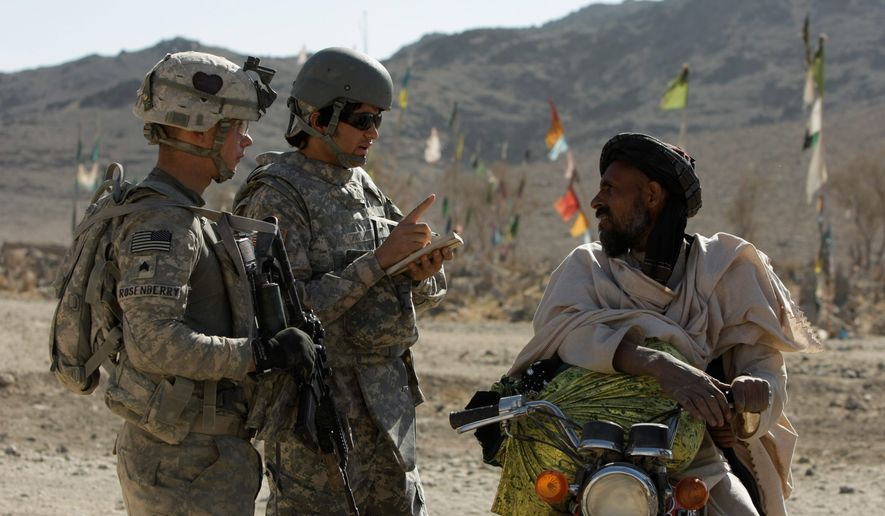Congress is poised to approve visas for 4,000 more Afghan interpreters who aided the U.S. in the war on terror, but thousands of translators will remain in harm’s way due to a shortage of the entry authorizations.
About 12,000 Afghan translators have applied for a visa under a program Congress designed as a way to both thank them and help them escape often-dangerous situations, where attacks retaliating against them for helping the Americans have cost many their lives.
Katie Reisner, the policy director of the Iraqi Refugee Assistance Project, said leaving behind a translator is one of the biggest regrets for U.S. troops returning from tours of duty.
“For folks who come back from war, this is often the thing that still haunts them,” she said, “the folks they worked with who are now left in harm’s way.”
In addition to the 12,000 applications, there could be others who are eligible but have not applied, she said.
As the U.S. war effort has wound down in recent years, the push to get applications approved has grown. In 2010 and 2011 only 37 Afghans were approved for visas, according to State Department statistics. But in fiscal year 2013 that number rose to nearly 700 and to nearly 3,500 in fiscal year 2014, which ended Sept. 30.
SEE ALSO: Afghan soldier who killed U.S. general was disgruntled, not Taliban: report
Still, the visas take a while to approve, and a backlog has built up. The State Department initially asked for 8,000 total visas to last through the end of 2016. But lawmakers settled on 4,000, writing the new cap into their annual defense policy bill, which passed the House last week and will be voted on in the Senate this week.
“We’re grateful for the 4,000 that were allocated,” Ms. Reisner said. “It probably will not be sufficient to cover the current backlog or sufficient to cover the prospective need, but it’s absolutely enough to get the program running full-throttle again.”
The State Department has stopped conducting interviews or otherwise processing visa applications since it had no more to issue, Ms. Reisner said.
A State Department spokeswoman said the department does not comment on pending legislation.
Rep. Adam Kinzinger, Illinois Republican, said he’ll continue to fight for more visas to ensure no one who aided U.S. troops is left behind.
“The need for visas is still greater than this allowance, so I will continue to work with my colleagues to increase that number in the future to ensure we don’t leave any allies behind to be hunted down by the Taliban,” he said in a statement.
Almost 3,500 translators or other Afghan allies came to the U.S. in fiscal year 2014. When their immediate family members are included, more than 9,000 Afghans got their visas under the program that year, Ms. Reisner said.
All told, slightly more than 5,000 translators from Afghanistan have gotten visas since 2007. A similar program for Iraqis has drawn more than 7,000 others. Some of those who came in the early days of the program have now earned their citizenship.
The longer the wait, the more risk there is that those who aided the U.S. war effort will face retaliatory attacks. One report estimated that an Afghan is killed every 36 hours for being associated with the U.S. military.
As part of last year’s defense bill, lawmakers required State Department officials to process cases within nine months or else publicly defend why it was taking longer, Ms. Reisner said.
“We still see cases lasting longer than nine months for sure, but it did set the benchmark, I think,” she said.
The House Judiciary Committee was involved in the negotiations on the number of visas given out, since it relates to immigration.
Committee Chairman Bob Goodlatte, Virginia Republican, declined an interview, but a Judiciary Committee aide said that he “supports the program and agreed to expand it, but he also wants to make sure that abuses of the program are minimized.”
This year’s defense bill also helps Afghan interpreters who officially worked for NATO but served with U.S. forces.
Advocates for Afghan interpreters want to see more changes made to the program, including expanding who the translators are allowed to bring with them. The advocates say translators should be able to bring their parents or adult children if they face threats at home. The Iraqi translator program already allows that.
“There’s no reason why our government should be saying, ’Hey, we’ll give this level of protection to Iraqi allies, but we’re going to give only this reduced level of protection to our Afghan allies,” said Ms. Reisner.
A state department official said there are about 2,600 Iraqis who have applied for a visa and are still waiting in the pipeline.
Last year’s defense bill authorized the government to issue 2,500 more visas, more than 400 of which were given out to translators in fiscal 2014. About 1,500 Iraqis total received visas under the program that year. The program will end when all visas have been issued, the official said.
• Jacqueline Klimas can be reached at jklimas@washingtontimes.com.




Please read our comment policy before commenting.